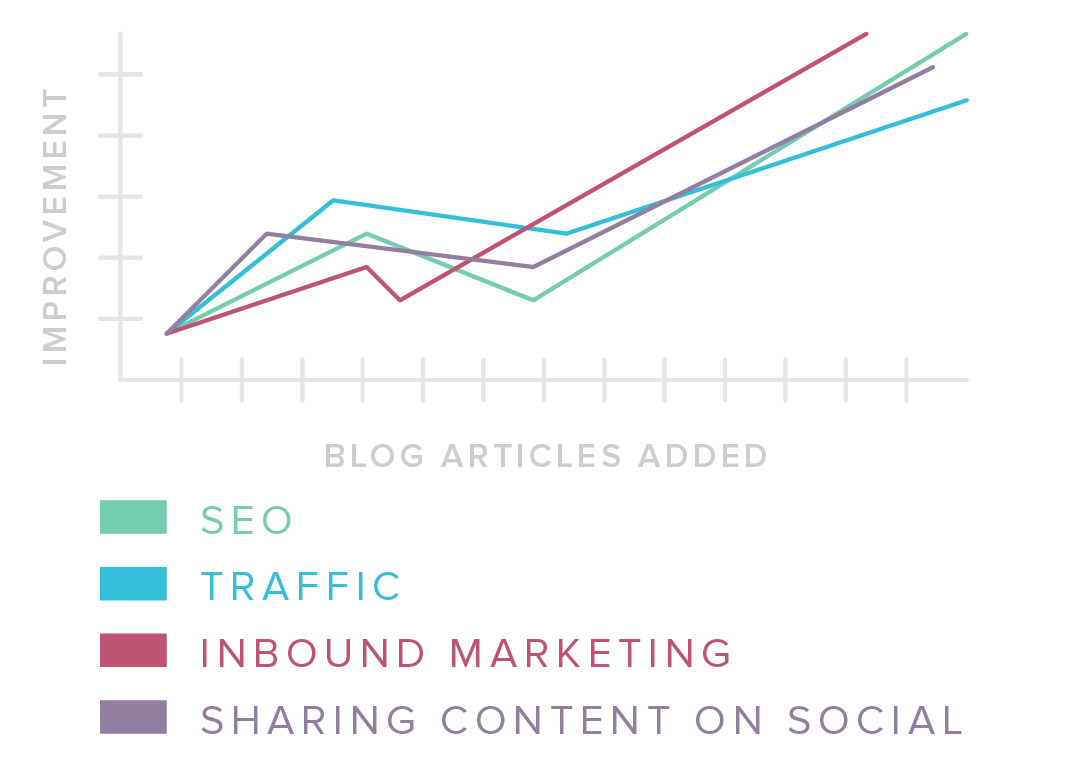Why use social media for business?
As of Buffer’s State of Social Media 2019 report, driving traffic to the company website is the biggest challenge that businesses currently face.
The success of a website is dictated by how much traffic and conversions it amasses; it’s the modern-day virtual store or office for your business.
If your site failed to attract the right prospects for the right reasons, what would be its purpose for existing?
Though it may seem like Google and search engine optimization (SEO) are the most important factors in the equation, there are so many other platforms that could make a huge impact on traffic—when done well.
These other platforms, in the case of the ebook below and marketing strategies around the world, are social media.
Chances are that you’re reading this because you have a great website, great content, and yet...the leads aren’t coming in, and traffic is more sparse than a highway in Wyoming during rush hour.

Conversely, if you’re reading this because your website’s traffic is decent but could be improved, you’re in the right place as well.
Why?
because social media is huge.

Not only in the amount of users it gathers in a single place, but also because of its potential—both free and paid—to rake in quality clients like virtually no other tool.
Consider these statistics:
-
As of January 2022, there are 3.96 billion total social media users across all platforms.
-
The average person bounces between seven different social networks per month.
-
The amount of time adults use social media across all platforms is now higher than ever — 95 minutes per day.
-
TikTok is the fastest-growing social network with a staggering 105% user growth rate in the US over the past two years.
-
As of 2022, Facebook usage and activity are down to 33 minutes per day on average (versus 39 minutes daily in 2017).
More detailed statistics on Sprout Social.
There is so much you can do with social media—so much, in fact, that each platform deserves its own chapter to cover all the possibilities that are available to you.
That way, you truly get the most out of each platform.
Ready to get started?
Read on to get a sneak preview of the ebook—let's start with Chapter 1: General Tips.
So, where to begin in the big world of social media?

Let’s get warmed up with some pointers that will help you succeed across the board, no matter which platform you start with.
General Tips on Driving Traffic to Your Website
While the bulk of this ebook series will hone in on all the strategies that will make social media work to your website’s advantage, it’s important to mention some general best practices that can be applied across the board that will help all areas of your social media marketing.
No matter what platform you’re on, or the goal of the marketing strategy, follow these tips to drive traffic to the company website in a smarter way.
1. Set a goal for each site and track it
You can’t just blindly dive into a strategy without first identifying what it is that you want to achieve.
Traffic is the goal, yes, but how much and in what time frame? You want people to complete your contact form, but what kind of leads are you aiming for?
These kinds of questions are why you must make sure that your goals are SMART.

We’ll break it down with the example below.
Instead of:
"I want to drive more traffic to my company website."
Try:
"I want to increase unique visitors from social referral traffic by 20% in 3 months."
The second goal is...
- Specific: not just “website traffic” in general, but specifically unique visitors from social referral traffic. That way, other traffic doesn’t dilute or overinflate the results.
- Measurable: the key metric, visitor count, is easily measured in Google Analytics or similar software to ensure that the goal can be monitored for progress. If the goal metric was unidentified and untrackable, there would be no way of determining success or failure.
- Attainable: just increasing unique visitors without a finite numerical amount would make the goal virtually endless. With the specific increase of 20% more visitors than the start of the time period (and not as many as possible), you either hit or miss your goal.
- Realistic: a moderate increase of 20% in 3 months is quite doable, while a huge increase of 90% more visitors in that frame of time probably isn’t.
- Time-sensitive: you have a goal amount that needs to be hit by the end of the 3-month period; this helps keep you on schedule and defines the timeframe necessary to deem it a success.
The best way to stay on course with your goals for each site is to monitor the analytics of your website and beyond.
Google Analytics is a great platform that has all the data you need to determine what’s working and what’s not.
Most social media sites now have their own analytics that lend helpful clues as to how and why users got from their social media platform to your site, but the real juicy data—all of the activity on your website resulting from social media traffic—resides on the Google Analytics side instead.
Sure, some of the more robust social analytics provide a lot of detail, but you're not going to find much more than just the amount of website clicks from posts.
Some key Google Analytics metrics to track include:
- Referral traffic (specifically from social): gives you a clear picture of how well you’re attracting visitors from your social media efforts, conveniently broken down by platform.
- Average session duration: once visitors get there, is there basis for sticking around? If users are spending a lot of time on your content, such as your blog or portfolio, it shows that the right people are getting value out of your business’s website because it appeals to their needs.
- Goal conversion rate: if your goal is to get people to fill out a contact form or otherwise take an action that drives them further down the purchase funnel, it’s important to keep track of how effective this step is in the whole scheme by measuring the amount of successful conversions.
- Bounce rate: this paints a picture of how relevant the content on your site is to users. A bounce is defined as “a person leaving your website from the landing page without browsing any further or taking any action.” Therefore, a high bounce rate is a red flag; a low one means that your website is useful, helpful, engaging—and worth hanging out on.
- Page views: how many pages on your website are visitors checking out? More pages means there’s a higher level of interest per user and a bigger chance for conversion.
- New vs. returning visitors: this one can vary per website, but for most B2B businesses, having a user return to your site for more information is almost always a good thing. If a user didn’t convert the first time around but comes back, it shows that the user is still engaged, and your website is showing them a lot of good stuff that has piqued their interest.
2. Help to sell; don’t sell to sell

Your job is to give the gift of value, knowledge, and inspiration to your users in return for their presence on your site, and, ideally, their interest in working with your brand.
Outbound marketing just doesn’t work anymore because consumers are hyper-sensitive to being disrupted by advertising. You need to be there for your clients, at the right time, right place, and with the right gift to make them like and trust you. Your website is the ideal place for those kinds of interactions to happen, so keep your content fresh, savvy, and relevant to make the most of this selling machine. In this day and age, in order to get your ideal clients to your website, you must be active and helpful to them through social media. Think of social media platforms as your megaphone for amplifying the reach of your website’s content: the two work hand-in-hand because you need a playing field for attracting prospects, but you also need to give those prospects some quality content in return for their interest. Help your ideal clients help you.
3. Start a blog on your website
It’s a little too late in the game to not have a blog on your website, really, but sometimes businesses have limitations that can hinder this step. I’m here to tell you that you really should implement a blog section on your website if at all possible, even if it means that you post a new article once every quarter to start out. Not only is a company blog an excellent way to boost your search engine optimization (SEO) efforts by adding more pages to your website for Google to index, but it’s also the best means of proving your worth to potential clients.

To attract visitors from social media, you have to have some enticing bait that is worthy of following “over to the other side” in the first place. Writing quality, helpful content is just the thing, and it goes both ways: blogging gives you a stage for flexing your expertise, and it gives you plenty of links to share to social media as quality, original content, too. You can easily complete the traffic loop with a simple step: on your blog, add share icons to all the major social media sites where your target audience hangs out. That way, people who love your articles can easily share your content with their networks, expanding its reach to more people, ultimately driving more traffic back to your blog and website. If you can write such high-quality and relevant content that it drives readers to voluntarily share it with their network, part of the work is done for you.
However, this world is not all rainbows and puppy-shaped cupcakes. We, as marketers and business owners, can’t idly sit on our butts and hope that the traffic will flow effortlessly; we have to be the ones to start the conversation.
4. Engage with your ideal clients
Your perfect clients are out there, but summoning them to you is about as realistic as Nemo’s father, Marlin, finding him within minutes of his kidnapping (or...fishnapping?). It took Marlin a whole, full feature film to succeed in his quest, and so will attracting your ideal prospects, metaphorically speaking.
They won’t find you in the clutter. You have to find them, simple as that.
How do you even start? Set aside some time every day—even as little as 15 minutes—to search for ideal, quality prospects based on their industry, job level, or, if your business is local, geography. Reach out, introduce yourself, start a conversation via direct message or by commenting something insightful on their social posts, follow them. When you reach out first and hand-select your leads, there’s a higher chance of engagement, especially when you “gift” them a piece of content that helps them on their personal journey.
5. Choose your words wisely
Whether you’re crafting an ad or a caption for a social post, you want to use power words to compel your audience to take an action. There are ample lists out there boasting as many as a thousand words that you must include in your copy, but here are a few of the best:
• You
• Money
• Save
• New
• Results
• Healthy
• Easy
• Safety
• Love
• Discovery
• Proven
• Guarantee
These words have statistically resulted in higher engagement than others, so try strategically (not haphazardly) sprinkling them in wherever you can to convince people to click through to your site. Just make sure that what you promise can be delivered; you never ever want to lead people to your site with certain expectations and then mislead them entirely. Not only will it harm your goal by causing a spike in the bounce rate and returning visitors rate, but it also reflects poorly on the trustworthiness and reputation of your brand. Word travels fast online, so only deliver what you know you can to avoid building a bad presence.
6. Hashtag it up, if and when appropriate
R.I.P. to the original name and purpose of “#”—it’s now so widely known as the hashtag that the youngins can’t locate the “pound sign” on a phone if their life depended on it. We can thank Twitter for introducing this handy little tool to us almost exactly a decade ago.
Hashtags are like the secret weapon of organic reach... but only when used by the “rules” of each individual online community that your brand is a part of. Even
so, consider that 75% of people on social media use hashtags, so if they fit into the platform’s usage guidelines, utilizing hashtags is often more normal than not. For instance, it would make a whole lot of sense to use a hashtag on Twitter, as the hashtag inventing platform is so into them that there’s a “trending hashtags” section displayed on the side of the page. On the other hand, there’s no use in hashtagging anything on LinkedIn, where rumors fluctuate between claims of hashtags not working on the site and people despising their use.
We’ll dive deeper into the uses of hashtags per platform (including frequency, popularity, and more) later on in this ebook, but start thinking now about how you can incorporate them into your strategy to take your organic reach so much further than before.
7. Be visually appealing
And no, I don’t mean you as a person. It’s a well-known fact that visual content performs much better on social media and websites than text does. In fact, visual content gets an average of 40 times more social shares than any other form of content. That could include anything from photos to infographics; the creative freedom is wonderfully endless.
This is exceedingly cliché, but if a picture is worth a thousand words, then, by golly, use it to amplify the story you’re telling. Nice visuals help break up the ocean of text that is otherwise a blog article. When used in a social post, images can help you say less in the caption while telling the reader more about the context.
Just remember to always focus on quality over quantity in everything you do; images are no exception. If you can afford to create custom, branded images for your website and social posts, I guarantee that they’ll engage more people than some cheap, overused, stock photography will.
8. Video is no longer optional
You absolutely need to incorporate video into your marketing strategy, whether you’re uber successful in driving website traffic or not. (Hint: the most successful brands are already capitalizing on it.) Nothing drives a point home like facts, so here are just a few to help you understand the importance of this format of content: • More video content is uploaded to the internet in 30 days than the major U.S. television networks have created in 30 years.
• Globally, Internet video traffic will be 82% of all consumer Internet traffic by 2022, up from 73% in 2017.
• ⅓ of online activity is spent watching videos.
• Millennials watch the most online videos out of any generation.
• Social videos generate 1200% more shares than text and images combined.
• 59% of executive-level users prefer to interact with a topic through video format rather than text.
• 87% of online marketers use video content in their strategy.
• Marketers who use video grow their revenue about 49% faster than non-video-using marketers.
• Viewers retain 95% of a message when they watch it in a video compared to only 10% retention when reading the same message in text form.
• 81% of consumers say that they currently interact with brands on social media, and 43% say that they’ve done so through watching branded social videos.
• When respondents in a survey were asked for their favorite type of branded content on social networks, video was the most popular answer, with 31% of the respondents listing it as their number one choice of content.
9. Mobile is important, too
Your website absolutely must be mobile-friendly. Although plenty of people still use desktop computers to browse the web, the percentage of mobile use, across all age groups, is steadily growing every year. Besides, it’s better to be proactive and optimize for mobile before it’s too late...and your website takes a major hit from Google for not accommodating all device types.
Consider, too, that social media is increasingly dominating as a mobile activity: in the case of Instagram, only 1% of their total traffic is from desktop. Meanwhile, Facebook has 1.57 billion daily active users on mobile. While other social sites do have much more
desktop traffic than just a single percent, it’s impossible to assume that there are any desktop-only accessed platforms out there anymore; therefore, you should always prioritize mobile optimization.
So, video is important and mobile-friendliness is important too, which means mobile-friendly video is super important. So important, in fact, that over half of video content is viewed on mobile. A benefit to optimizing your videos for mobile is the engagement you’ll receive in return: 92% of mobile video viewers share videos with others. Make interesting, high-quality video footage that’s optimized for mobile devices to help people help you expand your reach further and further.
FINAL THOUGHTS
These general tips will serve you well in whatever marketing endeavor you undertake, both on your business’s website and the social media side of your strategy. In order to talk specifically about all the wonderful ways that social media can help you drive hoards of quality traffic to your site, however, we’re going to have to dig a lot deeper.




